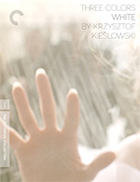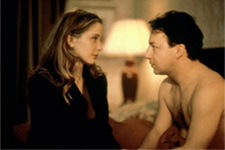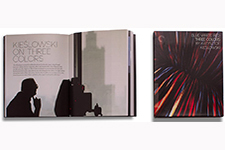| Director: Krzysztof Kieślowski | | Screenplay: Krzysztof Piesiewicz and Krzysztof Kieślowski | | Stars: Zbigniew Zamachowski (Karol Karol), Julie Delpy (Dominique), Janusz Gajos (Mikolaj), Jerzy Stuhr (Jurek), Aleksander Bardini (The Lawyer), Grzegorz Warchol (The Elegant Man), Cezary Harasimowicz (The Inspector), Jerzy Nowak (The Old Farmer), Jerzy Trela (Monsieur Bronek), Cezary Pazura (Bureau de Change Proprietor), Michel Lisowski (The Interpreter), Philippe Morier-Genoud (The Judge) | | MPAA Rating: R | | Year of Release: 1994 | | Country: France / Poland / Switzerland |  |
|  Krzysztof Kieślowski’s White (Blanc) is, by any stretch of the imagination, an odd seriocomic film. The middle part of Kieślowski’s Three Colors (Trois couleurs) trilogy, it stands apart from the other films (which are otherwise tightly interconnected in theme and tone) by virtue of both its unexpected darkly comedic tone and its geographical shifting. While the other two films, Blue (Bleu, 1993) and Red (Rouge, 1994), are firmly situated in a particular city (Paris and Geneva, respectively), White shifts from Paris to Warsaw halfway through, which is crucial to the film’s ironic play on the concept of “equality” between the sexes and between Western and Eastern Europe. The films of the Three Colors trilogy, all of which were co-written by Kieślowski and Krzysztof Piesiewicz, were made during a particularly crucial period in Europe’s history, just a few years after the fall of communism when former Eastern Bloc countries like Poland were moving rapidly toward democratization and the development of market economies. White was Kieślowski’s first return to his native country since making the epic television mini-series The Decalogue (Dekalog) in 1988, and the film reflects the cultural and economic shifts in Poland, as well as Kieślowski’s recognition that the rest of Europe was not always particularly accommodating nor appreciative of their eastern neighbors coming out from behind the Iron Curtain. White is ostensibly the story of a marriage gone bad and the humiliated husband’s attempt to both put himself back together and avenge himself on his ex-wife—or perhaps get her back because he is still inexplicably in love with her. It is no surprise, then, that the humiliated husband, a meek, sad-eyed hairdresser named Karol Karol (Zbigniew Zamachowski), is Polish and the cruel wife, an icy blonde named Dominique (Julie Delpy), is French. When the film opens, Karol is being summoned to court for his divorce, which Dominique has demanded primarily on the grounds that their marriage was never consummated. If having one’s impotence called out in a court of law weren’t humiliating enough, Dominique also takes all of their possessions, freezes all of their bank accounts, and threatens to frame Karol for arson if he doesn’t exit her life immediately. Since he is essentially destitute, Karol has no choice but to go back to Warsaw, which he does by stowing away inside a large suitcase with the help of Mikolaj (Janusz Gajos), a tall, depressed fellow Pole he meets in the Paris Metro while trying to earn coins playing music on a jerry-rigged kazoo made out of a comb and a piece of paper. Once back in Warsaw, Karol returns to his career as a hairdresser alongside his brother Jurek (Jerzy Stuhr), but like his native country, Karol yearns to achieve more. His upward mobility is hastened by his snatching a lucrative land deal out from under the nose of a money changer (Cezary Pazura) who has hired him as a security guard (the prospect of meek Karol guarding anyone or anything is one of the film’s funniest conceits). This makes him enough money that he is able to start his own company with Mikolaj, which gives him the financial power to set in motion a convoluted (and frankly preposterous) plan to fake his own death in order to draw Dominique back to Poland and humiliate her. In many ways, White is a comedy, particularly in its opening half, which is not something that is immediately associated with Kieślowski, who is better known for his rigorous, austere explorations of abstract philosophical issues. He is still in that mode here, as White is as much about the baffling depths of obsessive love as anything, but the frequently absurdist narrative makes for a striking contrast with his other films. Kieślowski plays it straight for the most part, although he throws in a number of amusing jokes and sight gags, such as Karol awkwardly looking down the barrel of his gun while he is ostensibly working as a security guard and his happily sighing “I’m home” after being beat up and dumped in a Warsaw landfill. Unfortunately, the second half of the film doesn’t hold up as well as the first half: Zamachowski is so wonderfully effective as a sad-sack that it’s hard to fully buy into his social and economic ascent, not to mention his revenge scheme. It all makes sense in the end, and Kieślowski even finds a way to bring the film to a close on a bittersweet note that possibly upends everything we thought we knew, but it doesn’t quite live up to the filmmaker’s best films, which, while often inscrutable, always feel completely of a piece. | Three Colors: Red Criterion Collection 4K UHD |  Three Colors: White is available exclusively as part of the six-disc “Blue White Red: Three Colors by Krzysztof Kieślowski” box set, which also includes Three Colors: Blue (1993) and Three Colors: Red (1994) on both 4K UHD and Blu-ray. Three Colors: White is available exclusively as part of the six-disc “Blue White Red: Three Colors by Krzysztof Kieślowski” box set, which also includes Three Colors: Blue (1993) and Three Colors: Red (1994) on both 4K UHD and Blu-ray. | | Aspect Ratio | 1.85:1 (all three films) | | Audio | French DTS-HD Master Audio 5.1 surround (all three films) | | Subtitles | English | | Supplements | Three Colors: Blue“Cinema Lesson With Director Krzysztof Kieślowski” featurette“On Blue” video essay by film studies professor Annette InsdorfVideo interview with Three Colors composer Zbigniew PreisnerSelected-scene commentary by actor Juliette Binoche“Reflections on Blue” featurette“Kieślowski: The Early Years” featuretteThe Tram (1966), a student short by KieślowskiThe Face (1966), a short starring KieślowskiOriginal theatrical trailer Three Colors: White “Cinema Lesson With Director Krzysztof Kieślowski” featurette“On White” video essay by film critic Tony RaynsVideo interview with cowriter Krzysztof PiesiewiczVideo interviews with actors Zbigniew Zamachowski and Julie DelpyShort documentary on the making of WhiteTwo short documentaries by Kieślowski: Seven Women of Different Ages (1978) and Talking Heads (1980) Original theatrical trailerThree Colors: Red “Cinema lesson with director Krzysztof Kieślowski” featurette “On Red” video essay by film writer Dennis LimVideo interview with actor Irène JacobVideo interview with producer Marin KarmitzVideo interview with editor Jacques WittaBehind-the-scenes footageShort documentary on the film’s world premiere at CannesKrzysztof Kieślowski: I’m So-So ... (1995) feature-length documentaryOriginal theatrical trailerInsert booklet featuring essays by film critics Colin MacCabe, Nick James, Stuart Klawans, and Georgina Evans; an excerpt from Kieślowski on Kieślowski; and reprinted interviews with cinematographers Sławomir Idziak, Edward Klosinski, and Piotr Sobocinski | | Distributor | The Criterion Collection | | Release Date | February 7, 2023 | | | COMMENTS | | Criterion originally released the three films in the Three Colors trilogy on Blu-ray in November 2011, and they looked great for that time. This new 4K UHD + Blu-ray box set includes all new restorations of the three films, starting with new 4K scans of each film’s original 35mm camera negative by MK2 and subsequent digital restoration. The restoration of Blue was performed under the supervision of cinematographer Sławomir Idziak,while the restoration of Red was supervised by cinematographers Piotr Sobociński Jr. and Michał Sobociński, the sons of the late cinematographer Piotr Sobociński. The restoration of White was done with reference to an archival 35mm theatrical print as a color reference. All three films in the Three Colors trilogy looks absolutely gorgeous, with substantial improvement over the previously available Blu-rays, especially when viewed using Dolby Vision HDR, which gives the films’ intense color schemes even more vibrant life. Criterion has delivered a trio of top-notch transfers that have Kieślowski’s final films looking better than they ever have, at least since their theatrical releases. All three films boast great contrast and detail, good depth, a fine veneer of grain to give them a pleasantly filmlike appearance, and absolutely gorgeous colors that are even more naturalistic and less manipulated than earlier releases. The blues, whites, and reds that dominate the respective films are appropriately cool, clean, and sensual. I can’t imagine the films looking much better on video. This box set also offers a big improvement in sound, with each film boasting a newly mixed DTS-HD 5.1-channel surround soundtrack created from the 35mm magnetic tracks (the Blu-rays feature two-channel surround tracks). Sound is a crucial element of Kieślowski’s films, whether it be the orchestral scores or the diegetic sounds that often provide as much, if not more, narrative and thematic information than the visuals. The soundtracks are clean and well defined and have an impressive robustness and sense of depth and immersion. All of the supplements from the 2011 Blu-ray box are included here. As befits a box set dedicated to the thematically and narratively interlocking films of the Three Colors trilogy, there are a series of repeating rhymes and patterns in the supplements for each of the three films. In lieu of an audio commentary, each film is given a 20-minute visual essay created in 2011 in which an esteemed film scholar examines its themes and aesthetics: Blue is covered by film studies professor Annette Insdorf, White is covered by critic and festival programmer Tony Rayns, while Red is covered by film critic Dennis Lim. Each of the three films also contains a “Cinema Lesson With Director Krzysztof Kieślowski,” which are short video pieces that apparently ran on French television around 1994. In each piece Kieślowski sits at an editing table and discusses in detail how he conceived and shot a particular scene from the respective film (the sugar cube sequence in Blue, the opening credits sequence in White, and Rita running away from Valentine in Red). Each disc also features each film’s original theatrical trailer, as well as video interviews (running an average of 19 to 20 minutes in length) with Kieślowski’s collaborators recorded in 2011 that shed light on both the production of each film and what it was like to work with the masterful director. On Blue we get an interview with composer Zbigniew Preisner, who has collaborated with Kieślowski on numerous projects since the mid-1980s, including The Decalogue and all three Colors films. The White disc contains an interview with co-writer Krzysztof Piesiewicz (who co-wrote all three films) and interviews with actors Zbigniew Zamachowski and Julie Delpy. And the Red disc features interviews with actor Irène Jacob, producer Marin Karmitz (who produced all three films), and editor Jacques Witta (who also edited Blue). Criterion also dug into the archives, giving us an impressive array of older material to help contextualize the films and shed some light on the entirety of Kieślowski’s career. The Blue disc features two student films from 1966, The Tram, which Kieślowski directed, and The Face, in which he starred, as well as several supplements from 2004 that, from what I gather, had not been available in Region 1 prior to Criterion’s 2011 box set. These include a selected-scene commentary by Juliette Binoche and two featurettes: “Reflections on Blue,” which runs about 18 minutes, and “Kieślowski: The Early Years,” which runs about 15 minutes. Both featurettes include interviews with actor Juliette Binoche, film scholar Annette Insdorf, film critic Geoff Andrew, filmmaker Agnieszka Holland, cinematographer Sławomir Idziak, actor Irène Jacob, and editor Jacques Witta. On the White disc we have two of Kieślowski’s short documentaries, Seven Women of Different Ages (1978) and Talking Heads (1980), as well as a brief making-of featurette from 1994 that features behind-the-scenes footage during the production of White. And, on the Red disc we also have a short behind-the-scenes featurette from 1994, a short documentary about the film’s world premiere at the Cannes Film Festival, and Krzysztof Kieślowski: I’m So-So ... (1995), a 55-minute documentary that is essentially a lengthy interview with Kieślowski at his home in Poland. It originally aired on Danish television and was completed less than a year before the director’s death. And, finally, the handsomely designed box set also includes a thick insert booklet that features essays by film critics Colin MacCabe, Nick James, Stuart Klawans, and Georgina Evans; an excerpt from Kieślowski on Kieślowski; and reprinted interviews with cinematographers Sławomir Idziak, Edward Klosinski, and Piotr Sobocinski. |
Copyright © 2023 James Kendrick Thoughts? E-mail James Kendrick All images copyright © The Criterion Collection |



 (2.5)
(2.5)

 Three Colors: White is available exclusively as part of the six-disc “Blue White Red: Three Colors by Krzysztof Kieślowski” box set, which also includes Three Colors: Blue (1993) and Three Colors: Red (1994) on both 4K UHD and Blu-ray.
Three Colors: White is available exclusively as part of the six-disc “Blue White Red: Three Colors by Krzysztof Kieślowski” box set, which also includes Three Colors: Blue (1993) and Three Colors: Red (1994) on both 4K UHD and Blu-ray.